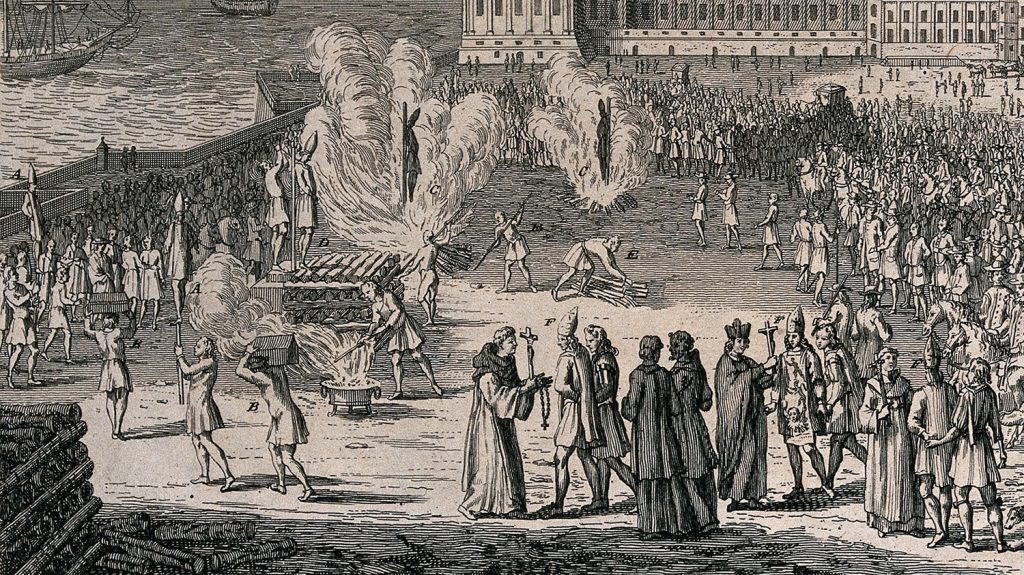The Dominican friar and first Grand Inquisitor of the Spanish Inquisition Tomás de Torquemada died peacefully in bed today in 1498. The same could not be said for the estimated 2,000 people who were hanged, strangled, beheaded and burned to death for heresy by the Inquisition during his 15 year reign of surreal fanaticism and terror (above). Torquemada dramatically expanded and refined the work of the Inquisition, whose mission was to root out heresy, and which also pursued blasphemers, sorcerers, Devil worshippers, excommunicates, Jews, Muslims, and apostates. His manual for inquisitors, published in 1576, gave precise instructions on interrogation, torture and punishment, which were all done in a warped spirit of Christian charity. In his own time, Torquemada was hailed as ‘the hammer of heretics, the light of Spain, the saviour of his country, the honour of his order,’ but in reality he was one of the worst monsters ever produced by Christianity.
‘If any, upon being denounced and convicted of the sin of heresy, shall deny and persist in his denial until sentence is passed, and the said crime shall have been proved against him, although the accused should confess the Catholic Faith and assert that he has always been and is a Christian, the inquisitors must declare him a heretic and so sentence him.’ Tomás de Torquemada, Copilacion de las Instruciones del Officio de la Sancta Inquisicion
Enrique Irazoqui, best known for his role as Jesus Christ in the acclaimed 1964 film The Gospel According to St. Matthew, directed by Pier Paolo Pasolini, died today in 2020. When he played Jesus, he was a 19-year-old economics student and a communist activist against Spanish fascism.
‘When I came back to Spain, the police took my passport away for having worked in a Marxist film. It was funny, the film was “The Gospel According to St. Mathew”, which had won two international Catholic prizes and had been shown at the Vatican Council.’ Enrique Irazoqui, 2003
Anne Bradstreet, the Puritan poet who lived in New England, died today in 1672. Born in Northampton, England, she emigrated with her family in 1630 to escape the persecution of Puritans under King Charles I, and was one of the founders of the Massachusetts Bay Colony. Bradstreet became the first published poet of America when a collection of her poems, The Tenth Muse Lately Sprung Up in America, was printed in London in 1650.
I heard the merry grasshopper then sing,
The black clad Cricket bear a second part.
They kept one tune and played on the same string,
Seeming to glory in their little Art.
Shall creatures abject thus their voices raise?
And in their kind resound their maker’s praise:
Whilst I, as mute, can warble forth no higher layes.
Anne Bradstreet, ‘Contemplations’
Michael de Bay, a Belgian Catholic theologian who mirrored Protestant ideas – such as prioritising the Bible and the Church Fathers rather than Thomas Aquinas and the medieval Scholastic theologians – died today in 1589. Despite his suspect views, which were condemned by the Pope, he was never formally condemned himself, and was even able to keep his theological professorship in Leuven.
It is the feast of St Euphemia, a young woman who died in the persecution of the Emperor Diocletian in 303 CE. She refused to make a sacrifice to Ares, the god of war, and died in the arena of Chalcedon after being mauled by a bear.
Image: Wellcome Collection
